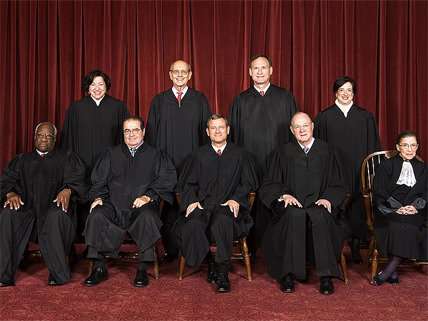Here's What John Roberts and Salon.com Have in Common
Conservatives and progressives share a common criticism of Justice Kennedy's gay marriage opinion.

Last week's historic Supreme Court victory for gay marriage has been widely praised by American liberals. But at the left-wing site Salon.com, one liberal law professor has cast a dissenting vote. Sure, Obergefell v. Hodges is "great news," concedes Northwestern's Andrew Koppelman, but the decision is nothing to get too excited about on account of "the remarkably weak reasoning by which the Court got there." What's the problem with the Court's reasoning? Here is Koppelman's explanation:
The decision relied on the doctrine of "substantive due process" — the idea that some liberties, not enumerated in the Constitution, are so important that government can't take them away. "The Constitution promises liberty to all within its reach," Kennedy's first sentence declared, "a liberty that includes certain specific rights that allow persons, within a lawful realm, to define and express their identity."…
Substantive due process, however, invites courts to invent new law out of nothing — to declare as constitutionally protected any conduct that they think is important.
Substantive due process is the idea that the Due Process Clause of the 14th Amendment—which forbids the states from depriving any person of life, liberty, or property without first providing due process of law—offers not just procedural safeguards but also protects a range of substantive individual rights. This doctrine played an important role in the Supreme Court's 1965 decision in Griswold v. Connecticut, in which the Court struck down a state law banning the use of birth control devices on the grounds that it violated the unenumerated privacy rights of married couples. Substantive due process also played a key role in the Court's landmark 2003 decision in Lawrence v. Texas, which struck down that state's ban on "homosexual conduct" for violating the liberty rights of gay people under the 14th Amendment.
But wait a minute. Aren't Griswold and Lawrence both cases where the liberal side won? Why would a liberal like Koppelman want to distance himself from the constitutional underpinnings of Griswold and Lawrence? Here is the explanation.
In addition to Griswold and Lawrence, substantive due process also played a central role in the Supreme Court's famous 1905 decision in Lochner v. New York, in which an economic regulation setting maximum working hours at a bakery was struck down for violating the unenumerated right to liberty of contract protected by the Due Process Clause of the 14th Amendment. To say the least, Lochner is not the sort of case that liberal law professors tend to admire.
But Lochner also poses a real problem for any intellectually honest liberal legal thinker. As I explain in my recent book Overruled, Griswold and Lawrence both owe a vast intellectual debt to Lochner. Indeed, as I put it, Lochner's libertarian DNA "lives on prominently today in the landmark liberal rulings that legalized birth control and eliminated state restrictions on 'homosexual conduct.'"
So what's an honest liberal law professor to do? On the one hand, liberals are supposed to hate Lochner for striking down state regulation that violated an unenumerated right. On the other hand, liberals are supposed to love Griswold, Lawrence, and now Obergefell for striking down state regulations that violated unenumerated rights. To his credit, Koppelman recognizes this fundamental contradiction in modern legal liberalism. He's struggling to reconcile the irreconcilable.
Ironically, Koppelman's liberal critique of Obergefell is practically the mirror image of the dissenting opinion cast in that case by conservative Chief Justice John Roberts. "Allowing unelected federal judges to select which unenumerated rights rank as 'fundamental'—and to strike down state laws on the basis of that determination—raises obvious concerns about the judicial role," Roberts declared in Obergefell. He went on:
Ultimately, only one precedent offers any support for the majority's methodology: Lochner v. New York, 198 U. S. 45. The majority opens its opinion by announcing petitioners' right to "define and express their identity." Ante, at 1–2. The majority later explains that "the right to personal choice regarding marriage is inherent in the concept of individual autonomy." Ante, at 12. This free- wheeling notion of individual autonomy echoes nothing so much as "the general right of an individual to be free in his person and in his power to contract in relation to his own labor." Lochner, 198 U. S., at 58 (emphasis added).
In other words, John Roberts and Salon are in total agreement: The Supreme Court's landmark decision legalizing gay marriage rests on a libertarian legal foundation that protects "the general right of an individual to be free in his person." In their common view, that right shouldn't exist. Thankfully, they're both on the losing side of this case.


Show Comments (253)